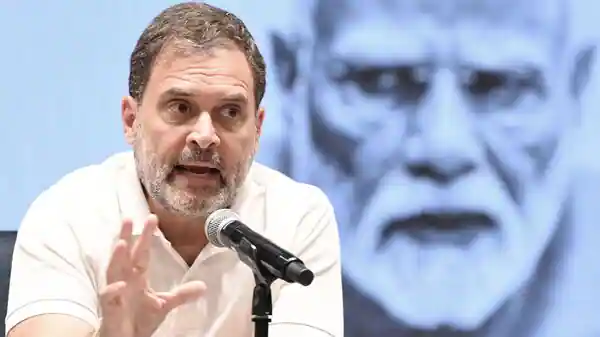Rahul Gandhi’s ‘Vote Chori’ Claim Triggers EC Action: What Lies Ahead for Indian Democracy?
- MGMMTeam

- Aug 8, 2025
- 4 min read
The phrase “vote chori hui hai” – alleging that votes were stolen – has now become a flashpoint in Indian politics. Rahul Gandhi, former Congress President and one of the most prominent voices of the Opposition, used the phrase repeatedly during his 2024 Lok Sabha campaign speeches. While his words drew applause from party supporters, they also triggered outrage from the ruling BJP and have now drawn the scrutiny of the Election Commission of India (ECI).
Taking serious note of the allegations, the ECI has asked Gandhi to back up his statements by submitting a sworn affidavit — a legal document under oath — affirming the truthfulness of his claims. This rare step by the country’s apex electoral body is being seen as a strong assertion of its commitment to protecting the integrity of the electoral process, and as a warning against unverified public allegations that could potentially damage institutional trust.

The Election Commission's Response
The Election Commission’s notice to Rahul Gandhi is not just a formality — it carries with it significant political and legal weight. Gandhi has been asked to either file an affidavit verifying the factual basis of his “vote chori” allegations or face potential action. The ECI believes that statements like these, especially when made by senior leaders during election seasons, must be substantiated with evidence or formally withdrawn.
If Gandhi chooses not to respond or refuses to sign the affidavit, the EC may interpret that as an admission of making unverified or exaggerated claims. In such a scenario, legal action under various provisions of the Indian Penal Code and Representation of the People Act could follow. The EC’s move is intended to send a clear message — electoral integrity is not up for casual political rhetoric.
Legal Implications of Non-Compliance
Legal experts say that if Rahul Gandhi declines to submit the affidavit or retract his comments, he could face consequences under Indian law. While defamation and the spread of misinformation are already punishable offenses, the Representation of the People Act includes specific sections that could apply to misleading the electorate. The Indian Penal Code also contains provisions, including Sections 171G and 505, that criminalize the deliberate spread of false information and statements intended to incite public mistrust or disorder.
Though prosecution in such matters is rare and politically sensitive, the precedent this case could set would be significant. It would signal that even high-ranking politicians are not above legal accountability when it comes to the integrity of India’s democratic framework.
Congress Defends Its Leader
Despite the growing pressure, the Congress party has firmly backed Rahul Gandhi, stating that his remarks were a reflection of growing public concern regarding electoral transparency and fairness. Party leaders argue that questioning the system, especially when the opposition believes it is being unfairly treated, is not just legitimate but essential to democracy. They allege that the Election Commission is attempting to silence dissent by demanding an oath from a political opponent instead of probing the concerns raised.
The Congress has also pointed out that concerns about EVM (Electronic Voting Machine) reliability, voter suppression, and institutional bias are not new. These issues have been raised by several opposition parties over the years, particularly in the context of reduced transparency, lack of full VVPAT verification, and media bias during election coverage.
BJP’s Sharp Retort and Demand for Accountability
The BJP has reacted strongly to Gandhi’s remarks and the Congress party’s support of them. Party spokespersons have condemned the “vote chori” phrase as an attempt to delegitimize the people’s mandate. They accuse Gandhi of launching an irresponsible attack on India’s democracy without any proof and claim that his comments are dangerous because they undermine public confidence in the electoral process.
BJP leaders have urged the Election Commission to take strict action if Gandhi fails to comply. They have also taken the opportunity to reiterate that the 2024 election was free and fair, monitored closely by national and international observers, with no evidence of large-scale electoral misconduct.
The EVM Debate: An Old Controversy Reignited
Rahul Gandhi’s accusations have reignited the longstanding debate over the use of EVMs in Indian elections. While the Election Commission and various courts have repeatedly defended the machines as secure, reliable, and tamper-proof, opposition parties have called for enhanced safeguards, such as 100% VVPAT verification and even a return to paper ballots.
Critics of EVMs argue that even the perception of vulnerability is dangerous for democracy, and that trust must be absolute. Proponents, on the other hand, believe that EVMs have strengthened the system by reducing counting errors, preventing booth capturing, and increasing efficiency.
The EC’s repeated demonstrations and public testing of EVMs haven’t silenced all critics. Gandhi’s “vote chori” comments suggest that a sizable section of the opposition still believes — or wants voters to believe — that EVMs are not infallible.
Conclusion: A Defining Moment for Political Discourse
This standoff between Rahul Gandhi and the Election Commission may well become a defining moment for political discourse in India. It places the burden of responsibility back on public figures who, in the heat of electioneering, often make sweeping claims without formal accountability. At the same time, it raises legitimate concerns about whether constitutional bodies are doing enough to investigate complaints, or simply suppressing dissent.
Whether Gandhi chooses to sign the affidavit or not, the implications of this confrontation are profound. It will test not just the credibility of a prominent opposition leader but also the resilience of India’s democratic institutions — especially in how they balance free speech, accountability, and public trust.
(Sources: LiveMint, Moneycontrol, Times of India)




Comments